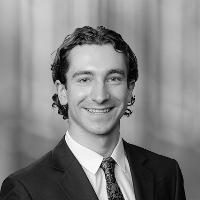White & Case
4 opportunities
Australia

Julian Grimm
Graduate
Bachelor of Laws / Bachelor of Global Studies, Monash University
What's your job about?
I am a Melbourne Graduate in my second rotation at White & Case, an international law firm. I am currently based in our Abu Dhabi office with the Project Development team.
My first six-month rotation was with the Melbourne Disputes team, and my final rotation will be with the Melbourne Environment & Planning team. I aimed for a variety of litigious and transactional work to round out my skills as a junior.
In the Disputes team, my day-to-day tasks involved legal research, drafting client advice, contractual interpretation and applying legal analysis skills to tasks like witness cross-examination strategies. The critical thinking and intellectual challenge of this work was the highlight. My work in the Abu Dhabi Project Development team has revolved around drafting, amending and proofing documents for major projects, attending contractual negotiations and communicating with clients. It has been valuable to hone these different skillsets.
I’ve been at White & Case for one year, and so far, I have worked from our Melbourne, Sydney and Abu Dhabi offices, as well as doing a refugee secondment in Greece. Right from the beginning I was involved in fascinating projects worldwide and pro bono matters spanning refugee law, anti-human trafficking and sustainability initiatives, showcasing the benefits of working for a global law firm.
What's your background?
I grew up by the beach in Sandringham, Melbourne. At the tender age of six, my dreams of being a fire truck were cruelly dashed, so I figured that law was the logical next step. I saw law as a path to achieving positive social change and I was passionate about making a difference.
In high school, I did a reciprocal German exchange. My German host brother and I surfed our way up and down the Melbourne coast, then I went on exchange to his family in Munich. Living abroad cemented my curiosity about global cultures, languages and politics. It was also a big, independent step for me at the time, which I wasn’t sure of. With encouragement from my family, I’m very glad I seized that opportunity.
I combined these interests and studied Law and Global Studies at university. I was involved in social justice law programmes, which led me to work as a legal volunteer at Environmental Justice Australia. This confirmed my passion for environmental law. I also went on exchange to the University of Navarra, Spain, where I studied a combination of international law and geopolitics. All these experiences led me to White & Case. I applied for White & Case to pursue an international legal career, and to work at the forefront of renewable energy and environmental sustainability.
Could someone with a different background do your job?
Yes, definitely! The majority of the practical skills you need are taught on the job, so the graduate programme is a learning process where a range of backgrounds are welcomed. The two key characteristics to succeed are enthusiasm and a growth mindset.
Law is a team sport, so being a positive, enthusiastic team player is important to collaborate effectively and build trust with your team. Secondly, as a graduate you’ll be faced with new tasks and challenges. Having a growth mindset will help you adapt to these. This involves having a willingness to learn, grappling with being unsure, asking questions, learning from mistakes, and accepting feedback on the way to improving.
What's the coolest thing about your job?
Getting to work in Abu Dhabi for six months has been the coolest thing about my job. White & Case guarantees graduates the opportunity to do an overseas rotation and the experience has been incredible. I’ve been involved in high-stakes negotiations, had face to face contact with clients and worked on major projects across Europe, the Middle East and Africa.
I’ve enjoyed travelling, experiencing different cultures, and forging new friendships across the offices. My overseas rotation has reinforced how globally interconnected White & Case is. It feels surreal that even as a graduate you can make an impact and play a part in cutting edge initiatives all around the world.
What are the limitations of your job?
Time management is the hardest part of my job. We juggle responsibilities for multiple workstreams, sometimes with coinciding or conflicting deadlines. There can be a steep learning curve in communicating capacity, setting realistic expectations and managing the workload. Inevitably, time pressures mean that I work some late nights, but developing the skill of communicating with supervisors about the workload and achievable deadlines can make life so much easier and less stressful.
3 pieces of advice for yourself when you were a student...
• Join the squash club! Getting involved in clubs and the social life of university is half the fun, and whilst I was involved in the Law Society, it is good to branch out into different areas. Squash is one of my favourite sports (my other true love: bouldering) and keeping up physical activity is crucial for me to stay balanced.
• Definitely go on exchange! Doing my university exchange in Pamplona, Spain was one of the best decisions I’ve ever made.
• Embrace opportunities! I made a habit of plunging into opportunities which would push my comfort zone, or I was nervous about. It made life a whole lot more exciting!

Emily Theseira
Graduate
Juris Doctor, University of Sydney
What's your job about?
I work for White & Case LLP – a US law firm with offices globally. I am employed as a law graduate, meaning I am currently doing rotations in various teams with the objective to settle at the end of the program.
As a graduate, my role is to develop my own technical and professional legal skills and support the other members of the team with their matters. On a typical day, I will start by checking my to-do list. If I have capacity, I will reach out to other members of the team to see if they need any support. The work I typically do includes drafting (for example, first drafts of transactional documents, advice memorandums and briefs to counsel), reviewing documents (for example, company constitutions and security documents), research (for example, considering legislation, case law and commentary) and general matter management (for example, preparing execution packs, running company searches and managing conditions precedent checklists).
There are many skills required to effectively manage this daily workload, but the key skills would be prioritisation, time management and communication. In order to keep on top of various tasks for various matters that are being delegated by different task providers, knowing how to prioritise tasks and manage my time effectively is crucial. I also need to ensure I communicate my capacity to take on work with the team to ensure the most pressing tasks are properly managed and deadlines are met.
What's your background?
I grew up in Perth, Western Australia, where I did my undergraduate in Human Biology. I moved to Sydney in 2019 and was planning to do my Masters in Genetic Counselling. I also applied to the Juris Doctor program at the University of Sydney. Law was always something that intrigued me, but I did not consider it seriously until I received my offer. When I had an offer for Genetic Counselling and Law before me, I found myself drawn to the challenge of Law. On this instinct, I started my studies and loved it. Whilst studying, I took on various jobs in the industry, for example, working as a research assistant to a barrister and at Sydney Law School. I also took part in numerous extracurricular activities, such as negotiations and mooting competitions. With these experiences under my belt, I applied for clerkships. I worked over the summer at a different firm, then continued as a paralegal. It was in my final year that I applied to the White & Case clerkship. I spent that summer in the Debt Finance team, then started the following year as a graduate. I have been a graduate at White & Case for just over a year now. I have completed two rotations (the first in Financial Restructuring & Insolvency in Sydney, and the second in Tax in Melbourne) and am currently doing my final rotation in Debt Finance in Hong Kong.
Could someone with a different background do your job?
In terms of qualifications, no. To become a graduate, you need an Australian-recognised Law degree and to complete Practical Legal Training. Most law firms also require their graduates to have first completed a clerkship with them. As such, it is important to start applying for clerkships whilst you are studying, particularly in your pre-penultimate and penultimate years.
In terms of work, study and life experience, yes. Every experience is appreciated in this industry. It gives you a unique perspective which makes you stand out as an individual in the profession.
What's the coolest thing about your job?
The coolest thing about my job is that every day I contribute to the creation of a desired outcome. Clients come to law firms to achieve all sorts of things, whether to (amongst other things) restructure their corporate entities, commence or contest a claim or facilitate a deal. We are there to make that desired outcome happen, and oftentimes this involves an incredible amount of problem-solving and creativity. The satisfaction you feel when you contribute to such a thing is truly rewarding.
What are the limitations of your job?
In order to achieve a client’s desired outcome, you need to put in a lot of time and effort. When combining this with the numerous other client matters you are working on, you often cannot stick to the regular 9 to 5. This often depends on which team you work in, but inevitably there will be a time when you are working late.
3 pieces of advice for yourself when you were a student...
First, meet as many people and make as many friends as you can. The people you are studying alongside may one day be the partners you work alongside or the clients you gain work from.
Second, create opportunities for yourself. The legal industry is full of approachable and welcoming individuals. If there is a particular experience you want, then go and make it happen.
Third, take some time for yourself. Put time aside to understand your aspirations, expectations and well-being. This is the time to try new things. It will help make your transition into the profession seamless.

Beatrice Ho
Associate (Graduate at time of publication)
Juris Doctor, University of Sydney
What's your job about?
I am a first rotation graduate in the Project Finance team in the White & Case Sydney office. The work mainly involves the financing of large infrastructure projects, with a focus on renewables; such as wind farms and solar farms. Occasionally, we also work on refinancing and the acquisition of infrastructure assets. On any given deal, we are advising either the borrower or the lender (which is usually a group of banks).
My main job as a junior is to assist the senior associate and associate on the deal each day. My workflow generally changes weekly, depending on what stage the deals are at; often, I will assist with a few deals at a time. Common tasks in Project Finance include assisting with legal due diligence reports, reviewing company constitutions and trust deeds, as well as managing and editing documents during negotiations.
What's your background?
I grew up in Perth, where I went to school and did my undergraduate degree. One of the most important stages of my life would be my university education. I earned a Bachelor of Science, with majors in Biochemistry and Molecular Biology, before moving to Sydney to study postgraduate law (Juris Doctor). This combination of studies gave me a broad range of experience and perspectives. This, coupled with going to the UK as an exchange student, really influenced my decisions when it came to my future career.
I applied for the White & Case Sydney Winter Clerkship on a whim, after seeing that the Firm had not cancelled it during the aftermath of the first COVID-19 lockdown, in 2020. I did not really know what to expect from my clerkship, but I really enjoyed the experience. I found that the international focus of the Firm, and the type of work they did, was something that I had been seeking for. That really appealed to me. The prospect of working at a global law firm, with the advantages of a smaller Sydney office and the opportunity to do an international rotation as part of the Graduate Program, really excited me.
Could someone with a different background do your job?
Yes, absolutely! At a junior level, the Firm does not expect first rotation graduates to have all the technical skills. That is why we are there–to learn. Enthusiasm, the ability to learn quickly and being a team player will go a long way in this job. The ability to understand the big picture of the work we do, good communication skills, and being flexible and adaptable to changing work instructions, will also help immensely.
What's the coolest thing about your job?
The coolest thing about my job is definitely the international nature of the work and the opportunity to participate in domestic and international rotations, as part of the Graduate Program. Above all else, though, everyone is lovely to work with, super supportive and the office culture is really good!
What are the limitations of your job?
Being able to juggle the different deals and work that a lawyer has going on requires a lot of organisation. The nature of the work is client-driven, so inevitably, there will be times when a deal picks up, so we have to work late and on weekends. As such, we do not have a lot of control over our time, and we need to make some sacrifices when it comes to plans made in advance to see friends and family.
3 pieces of advice for yourself when you were a student...
- Don’t sweat the small stuff! One bad mark on an assignment or exam will not be the end of the world.
- Although corporate law might be your end goal, try to get as much diverse experience inside and outside the law as possible. It will help you develop into a more rounded person, and give you things to talk about during clerkship interviews.
- Relax and enjoy the journey. It is not a race, and you will never get back your university holidays once you start working full time.
